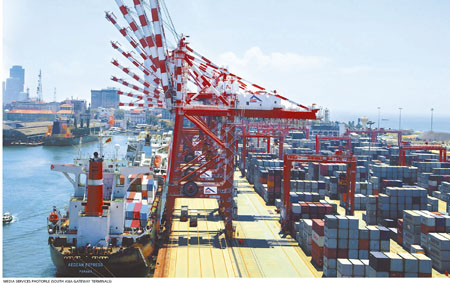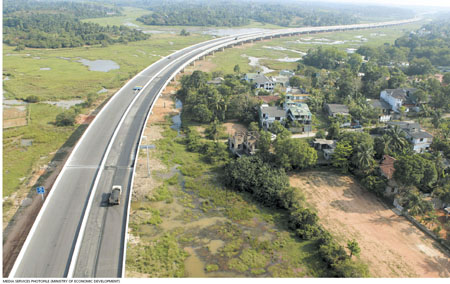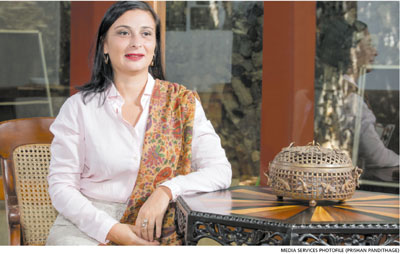COVER STORY
EXCLUSIVE
STRATEGIC TAKE ON
FISCAL POLICY
Eteri Kvintradze outlines the key policy priorities
for Sri Lanka to achieve fiscal consolidation
 The Resident Representative for Sri Lanka and Maldives of the International Monetary Fund (IMF) says that she is “honoured to serve in an exciting country at an exciting time.” Kvintradze joined the IMF in 2006 as a career economist responsible for designing new lending facilities and debt-limit policies for low-income nations.
The Resident Representative for Sri Lanka and Maldives of the International Monetary Fund (IMF) says that she is “honoured to serve in an exciting country at an exciting time.” Kvintradze joined the IMF in 2006 as a career economist responsible for designing new lending facilities and debt-limit policies for low-income nations.
Prior to joining the IMF, she served as Georgia’s Deputy Minister of Finance and has worked as Advisor to the Executive Director at the World Bank Board.
Eteri Kvintradze’s motto in life is to “stay calm and carry on.” Small wonder then that her hobbies range from cooking to snorkelling, both of which she must surely be indulging in during her tenure in Sri Lanka.
Inclusive growth, policy clarity and predictability, tax and regulatory simplification, and automation are on her wish list for Sri Lanka, as she describes the nation’s opportunities. The flip side of the coin has the country’s weaknesses clearly marked: burdensome, unpredictable and ambiguous regulations; and protectionism.
Kvintradze views our people, infrastructure and geographic location as being Sri Lanka’s chief strengths, and says that peace has been a boon for the island-nation. And to cap it all, her take on Sri Lanka in 10 years’ time is that it will be “a wonder of Asia.”
And it comes as no surprise that her pet subject happens to be fiscal consolidation, which is timely given Sri Lanka’s ongoing efforts to achieve just that. “Addressing fiscal consolidation and tax reform is the most important macroeconomic reform priority,” she asserts in an exclusive interview with LMD.
– LMD
 Q: How do you view Sri Lanka’s economy as it stands today?
Q: How do you view Sri Lanka’s economy as it stands today?
A: The economy has begun to stabilise. Having recorded 5.2 percent year-on-year (y-o-y) growth in the first quarter of 2016, GDP growth slowed temporarily to 2.6 percent in the second quarter, reflecting the impact of the floods in May on agriculture and manufacturing, as well as a decline in construction activity.
Leading indicators suggest a gradual recovery in activities in the second half of 2016 while credit growth remained robust at 27 percent y-o-y in August. Headline inflation decreased to 3.9 percent in September, having recorded six percent in June.
The Emerging Market Bond Index (EMBI) spreads continued to fall in the second quarter of 2016, reflecting an improvement in market confidence partly due to the three-year programme supported by the International Monetary Fund’s (IMF) Extended Fund Facility (EFF) that began in June last year.
As a result of signs of stabilisation, the government was able to successfully issue US$ 1.5 billion in international sovereign bonds at favourable yields in early July, which helped gross foreign exchange reserves recover to about 6.4 billion dollars at the end of September, having fallen for most of the year.
Q: The IMF approved a US$ 1.5 billion EFF for Sri Lanka that sets out the much-needed fiscal reforms. Do you think that enough has been done so far in the context of fiscal consolidation?
A: The primary goal of the Sri Lankan government’s reform programme is to return the country to a path of strong and inclusive growth with macroeconomic stability, by addressing key vulnerabilities such as low revenue and foreign reserves.
Achieving this goal will require structural reforms while strengthening external and fiscal resilience in a challenging global environment. The government’s programme, supported by the IMF, will reduce the fiscal deficit, rebuild foreign exchange reserves, and introduce a simpler and more equitable tax system.
With the first review of the EFF approved by the IMF Board in November, which enabled the disbursement of some 162 million dollars, all fiscal targets have been met and the budget is consistent with the programme framework that has been approved.
Q: What is your take on Sri Lanka’s tax system and what improvements are necessary?
A: When undertaking fiscal consolidation, the issue is not whether fiscal targets can be met.
Rather it is whether they can be met in a growth-friendly way through which budgets for social and infrastructure development are fully implemented.
Sri Lanka’s current tax revenues are one of the lowest in the world as a share of income. Low revenues force a government to fund its expenditure needs by borrowing domestically or externally, but the debt of Sri Lanka’s government is already at a high level. To provide essential services without adding to the debt excessively, the government needs to raise tax revenues from those who are better able to contribute.
Despite past reforms, Sri Lanka’s tax policy framework remains very complex. The number of taxes and rates are high by global standards but revenue collection is one of the lowest in the world. How can one explain that the high number of taxes at relatively high rates results in earning such low revenue? The answer is tax expenditure.
The total stock of tax exemptions, rate reductions, holidays and special provisions remain exceptionally high. An analysis of 2012/13 corporate returns finds that tax revenue foregone due to profit exemption is the equivalent of about 1.3 percent of GDP and exceeds actual corporate tax collections by around 30 percent.
This is almost surely an underestimate of the true revenue cost for several reasons – including that many tax holiday firms do not file income tax returns. Reducing or eliminating these special treatments could more than double corporate tax collections.
The EFF supports the government’s reform efforts in shifting the source of taxation from indirect to direct taxes, including by streamlining the currently excessive number of exemptions and holidays that erode the tax base. In this context, ongoing work on redrafting the Inland Revenue Act is critical to create a more transparent, fair and even-handed taxation framework that would better mobilise resources from people who are most able to pay. Commencing public consultation processes around the new direct taxation legislation would enable consensus-building to support the implementation of this key reform priority.
Tax policy needs to be considerably simplified to take advantage of ongoing automation efforts. And the government needs to bring along the business community to ensure the acceptability and applicability of new revenue systems.

Q: On what must the country focus to improve its export performance to attract quality and sustainable investment? In which export sectors and/or markets do you see potential for Sri Lanka?
A: The country fares relatively well in terms of qualitative indicators of competitiveness although there remains room for improvement. Sri Lanka ranks well in the World Economic Forum Global Competitiveness Index as well as the overall World Bank Ease of Doing Business Index, in which it ranks well ahead of the rest of South Asia. But there are areas for improvement such as implementing tax rates and administration policy, enforcing contracts and registering property.
Structural transformation may ameliorate some medium-term pressures on the external accounts. While exports of goods have decreased as a share of GDP, receipts from services have increased and now rival the apparel industry as a source of foreign exchange earnings. The most visible aspect of this is growth in tourism in tandem with transportation services, which is supported by substantial investment in port facilities. Rapid growth – albeit from a small base – is also visible in IT and accounting services.
 Q: In your view, is the private sector-led growth model sustainable in the Sri Lankan context?
Q: In your view, is the private sector-led growth model sustainable in the Sri Lankan context?
A: Both the private and public sectors have a role to play. Development is a dynamic process, and there is no single model that could fit different country circumstances or the changing global and regional environment.
It is not about who leads the growth, but how opportunities for growth are being created and if those enable inclusive development.
The public sector has to create an enabling environment for the private sector to innovate, create jobs, trade and compete.
In Sri Lanka, a burdensome and uncertain regulatory environment is often quoted as being one of the main concerns of the private sector. Addressing this may help unlock its potential.
Given the large size of the state sector in the economy, making public services more efficient and effective could help the overall performance of the economy as well.
Q: The IMF has emphasised the need for structural reforms in public financial management and state-owned enterprises (SOEs). Could you describe the reforms that are needed?
A: The IMF supports Sri Lanka’s ongoing efforts to introduce automated systems in revenue administration and public financial management, and improvements in financial discipline and oversight of SOEs. As a first step, agreeing and publishing statements of corporate intents between large SOEs, line ministries and the Ministry of Finance would enable better oversight over key performance indicators of these SOEs.
Developing an automated pricing mechanism for the provision of key public goods would also help SOEs manage their commercial operations more independently.
Q: How would you react to critics who maintain that lending institutions demand the implementation of unpopular measures – for example, an increase in the VAT rate in Sri Lanka – in return for funding?
A: A programme supports reform priorities defined by a government. In the past, fiscal consolidation in Sri Lanka was mainly implemented through spending cuts, as revenues consistently fell short of targets and continued to decline as a share of income.
Breaking from the past, authorities now aim to implement a consolidation based on revenue increases. It will enable the government to devote more resources to healthcare, education, infrastructure and other social spending that is required to ensure growth, a steady reduction in poverty and continuous improvement in social development indicators.
 In this context, in March the cabinet approved a number of measures that are aimed at directing revenues towards an increasing path. VAT rate increases are part of the measures that support spending programmes this year without adding to the debt excessively.
In this context, in March the cabinet approved a number of measures that are aimed at directing revenues towards an increasing path. VAT rate increases are part of the measures that support spending programmes this year without adding to the debt excessively.
Looking beyond the immediate needs, the programme also includes reform efforts to shift the source of taxation, which include reducing the excessive number of exemptions that erode the tax base. In this context, ongoing work on redrafting the Inland Revenue Act is critical to creating more transparent, fair and even-handed taxation.
Q: In both the developed and developing worlds, the gap between the haves and have-nots continues to widen. Why is it that institutions like the IMF and other influential lenders fail to address this when they impose conditions on countries that seek funding assistance?
A: Achieving inclusive growth is difficult. It requires actions that go beyond immediate macro stabilisation and vary from one country to another.
Well-designed public investment in education programmes not only raises underlying growth but also increases the earning potential of low-income people. The educating of girls and engaging them in the labour market also offers high returns to investment. Interestingly Sri Lanka has one of the most educated female labour forces in the region but participation rates continue to remain low. Unlocking this potential could help achieve more inclusive growth.
 Q: In your opinion, is the country’s current monetary policy stance aligned with emerging realities vis-à-vis inflation and exchange rates? And where would you like to see our monetary policy heading?
Q: In your opinion, is the country’s current monetary policy stance aligned with emerging realities vis-à-vis inflation and exchange rates? And where would you like to see our monetary policy heading?
A: Pre-emptive monetary policy tightening in July aimed to contain inflation and credit growth. While inflation has displayed early signs of abating, credit growth remains robust. With support from the IMF Institute for Capacity Development, the Central Bank of Sri Lanka has been developing econometric models for macroeconomic forecasting. Building on the progress achieved so far, the staff urged authorities to develop a roadmap to transition towards a flexible exchange rate regime and inflation targeting.
Q: As for infrastructure development, how much progress are we making – and at what cost; meaning debt? And is debt a ‘necessary evil’ given Sri Lanka’s stage of development?
A: The country is now at a critical juncture; it has significantly scaled up in terms of infrastructure, which is when the transition to private sector-led growth must begin. The private sector is expected to seek and utilise new opportunities that are presented to it.
As other episodes of infrastructure scale-up in different countries have demonstrated, liberalising the business environment is an important catalyst of private sector-led growth.
Predictable, fair and automated tax systems are central to the business environment. Improving these aspects will remove uncertainties that may hold back investment decisions. This would also make Sri Lanka’s business environment more conducive for long-term investment that may find a stable and predictable tax system more reassuring than special exemptions of a temporary nature.
Q: In your assessment, what external pressures are likely to pose the highest risk to the domestic economy? And could you hazard a guess as to what impact Brexit will have on Sri Lanka?
A: For the past several years, the state of the global economy has been weak and fragile. And this continues to be the case today especially in advanced economies. The prospects of emerging and developing economies merit some guarded optimism. They drove the global recovery following the 2008 financial crisis, and continue to contribute to more than three-quarters of the total global growth in 2016 and 2017.
The world is becoming an increasingly uncertain place. Short-term risks include worsening geopolitical tensions and volatility in financial markets.
Medium-term risks include stagnation and low potential growth in advanced economies. The new mediocre growth may become a new norm.
Asia remains the engine of global growth. China is appropriately rebalancing from manufacturing to services, from investment to consumption and from exports to domestic consumption – this could produce a more sustainable, albeit slower, growth model. Even so, it will grow at a robust rate of six percent.
India will grow more rapidly in the region as it is embarking on significant reforms – with fiscal consolidation, GST introductions, inflation targeting and the removal of FDI ceilings, to name a few. Such measures will propel its growth to seven percent.
Externally, Balance of Payments risks for Sri Lanka remain significant, including a shift in investor sentiment on emerging and frontier market economies, and slower-than-anticipated growth in the US and EU, which would constrain exports.
While the fallout from the Brexit vote on Sri Lanka’s external sector has thus far been muted, our staff estimates that a slowdown in the UK over the short to medium term would negatively impact the current account.
Q: What are the main challenges faced by lending institutions such as the IMF when working in the South Asian region?
A: The IMF is a diverse institution with 2,500 staff members who are from over 160 countries. We travel and work with 188 nations across the world. I have been working in South Asia for the past seven years, in four countries – Bangladesh, Sri Lanka, the Maldives and Bhutan. Prior to that, I worked in Eastern European and African countries.
Since the South Asian region has now become my home, it is difficult for me to say if challenges here are very different from those in other countries where I have not spent as much time.
Wherever they are, people respond to the same kind of incentives and want the same things – peace, a decent living, access to basic services, predictability and hope for the future. We may look different and hail from dissimilar backgrounds but we’re not that different after all.
 Q: What are your thoughts on corruption in this part of the world and what can be done to reduce its incidence? Do you think the business community can play a role to make a difference in this aspect?
Q: What are your thoughts on corruption in this part of the world and what can be done to reduce its incidence? Do you think the business community can play a role to make a difference in this aspect?
A: Increasing transparency is an integral part of the programme. It supports transparency measures in publishing lists of tax holidays, exemptions and rate reductions, as well as non-commercial obligations of state-owned enterprises for better public understanding of how their tax rupees are spent. The programme also supports ongoing automation efforts to help manage the government’s resources more efficiently.
Q: In conclusion, what are the key development priorities for Sri Lanka, going forward?
A: Addressing fiscal consolidation and tax reform is the most important macroeconomic reform priority. If tax reforms are implemented now, more public resources will become available for education and social development, which will support continuous improvement in Sri Lanka’s social development indicators.






Leave a comment